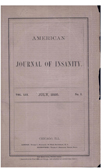Preliminary report of psychiatric disorders in survivors of a severe earthquake
Abstract
OBJECTIVE: The authors' goal was to study psychiatric morbidity after a natural disaster in rural India. METHOD: As members of a volunteer medical team assigned to 23 households in three villages in India affected by an earthquake, the authors examined the results of semi- structured interviews used to interview all of the adults (older than 14 years) in these households (N=56). DSM-III-R diagnoses were assigned on the basis of these interviews, and non-parametric tests were applied to comparisons of subjects who were or were not given a psychiatric diagnosis. RESULTS: Thirty-three (59%) of the subjects received a psychiatric diagnosis; the most common diagnoses were posttraumatic stress disorder (13 subjects [23%]) and major depression (12 subjects [21%]). Psychiatric morbidity was associated with female sex, destruction of house, and destruction of possessions. CONCLUSIONS: Attention to the mental health needs of disaster survivors in third world countries is indicated.
Access content
To read the fulltext, please use one of the options below to sign in or purchase access.- Personal login
- Institutional Login
- Sign in via OpenAthens
- Register for access
-
Please login/register if you wish to pair your device and check access availability.
Not a subscriber?
PsychiatryOnline subscription options offer access to the DSM-5 library, books, journals, CME, and patient resources. This all-in-one virtual library provides psychiatrists and mental health professionals with key resources for diagnosis, treatment, research, and professional development.
Need more help? PsychiatryOnline Customer Service may be reached by emailing [email protected] or by calling 800-368-5777 (in the U.S.) or 703-907-7322 (outside the U.S.).



